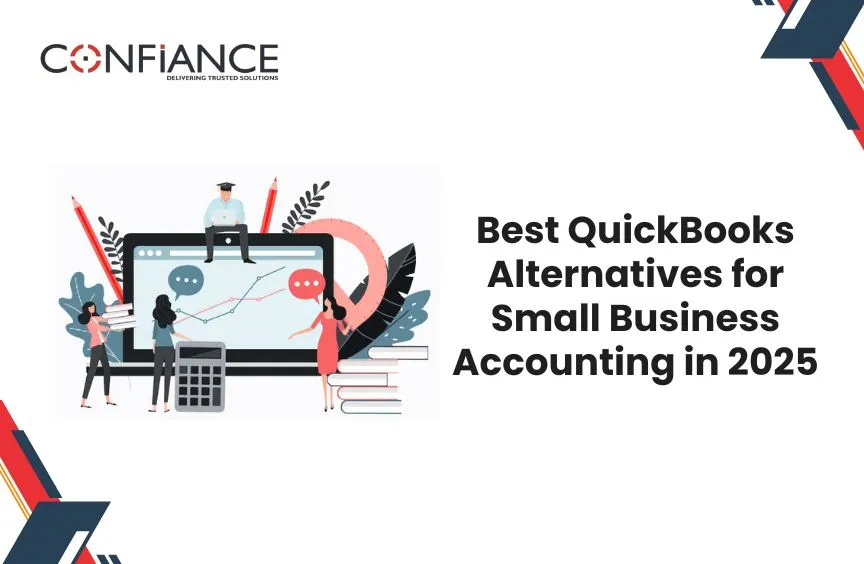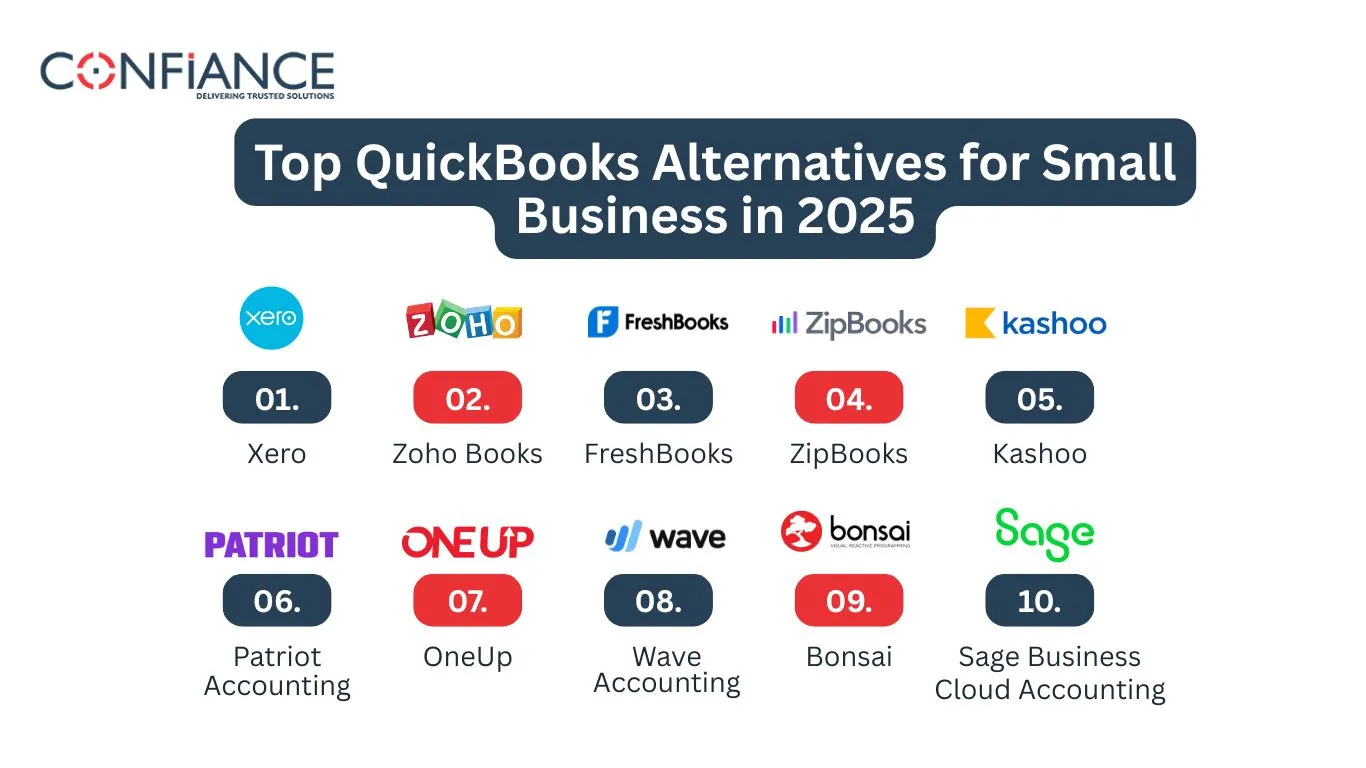
Best QuickBooks Alternatives for Small Business Accounting in 2025
QuickBooks has long been a go-to for small business accounting. But it’s not the only option. Many businesses now want different tools that better match their needs and budget. If you’re one of them, you’re not alone. In this blog, we will cover the best QuickBooks alternatives for small business owners available in 2025.
In 2025, there are many online accounting platforms that offer real value. They are easy to use, affordable, and built with small business users in mind. Whether you’re looking for better pricing, simpler tools, or more tailored features,
Why Look Beyond QuickBooks?
QuickBooks is popular but not perfect. Some users find it too expensive. Others say it’s too complex for what they need. Many feel the customer service is lacking. Also, some industries need special features QuickBooks doesn’t provide.
That’s where other accounting software for small business comes in. These tools focus on usability, support, and price. They give business owners control without the high cost or steep learning curve.
Top QuickBooks Alternatives for Small Business in 2025
Here are the top tools small businesses can trust to manage their books.
1. Xero
Xero is often seen as the strongest QuickBooks competitor. It offers a clean interface, solid features, and good value for money.
- Cloud-based, so you can work from anywhere
- Strong bank feed integration
- Easy to share data with your accountant
- Handles payroll, invoices, and reports
Xero also scales well. If you grow, it grows with you. Plans start at a lower cost than QuickBooks.
2. Zoho Books
Zoho Books is ideal for small businesses already using other Zoho apps. Even if you’re not, it stands well on its own.
- Affordable pricing
- Automated workflows
- Built-in time tracking
- GST-ready for global users
It covers most of what a small business needs. The mobile app is also one of the best in its class.
3. FreshBooks
FreshBooks is popular with freelancers and service providers. Its tools are simple, yet powerful enough for serious work.
- User-friendly design
- Strong invoicing tools
- Time tracking and expense reports
- Built-in client chat feature
It’s great for solo business owners who want more than spreadsheets but less bulk than QuickBooks.
4. Wave Accounting
Wave is one of the few truly free online accounting platforms. It’s perfect for very small businesses or sole proprietors.
- No monthly fee
- Unlimited invoicing and receipt scanning
- Clean dashboard
- Good basic reporting tools
It lacks advanced features, but for many, it’s enough. You can also add paid payroll or payment processing if needed.
5. Sage Business Cloud Accounting
Sage has been around for decades. Their online version is made for modern small businesses.
- Easy-to-use dashboard
- Quick setup
- Invoice and payment tracking
- Real-time financial reporting
Sage is best for those who want a mix of legacy experience and modern access.

6. Kashoo
Kashoo is for businesses that need simple accounting without distractions. It’s stripped-down but not weak.
- Single plan pricing
- Automatic categorization using machine learning
- Real-time bank feeds
- Strong privacy features
It’s a solid choice for users who don’t want a lot of bells and whistles.
7. ZipBooks
ZipBooks offers both a free and paid version. The free plan works for basic needs.
- Simple invoicing
- Online payments
- Financial health tracking
- Custom chart of accounts
The paid plans add more advanced reporting and automation.
8. Bonsai
Bonsai started as a freelance tool but has grown into a full accounting software for small business.
- Contracts, proposals, and invoices in one place
- Time and expense tracking
- Project management tools
- Tax tracking for self-employed
It’s best for creatives, consultants, and freelancers who manage their own workflows.
9. OneUp
OneUp is lesser-known but worth a look. It uses AI to reduce manual data entry.
- Smart automation for bookkeeping
- CRM and inventory features
- Quick invoicing and quote creation
- Works well for product-based businesses
It’s fast and helps automate many tasks most software still requires you to do by hand.
10. Patriot Accounting
Patriot is focused on small US-based businesses. It’s simple, affordable, and backed by strong customer support.
- Easy setup
- Strong support
- Payroll integration
- Bank reconciliation tools
It’s a strong pick for business owners who want clear pricing and responsive help.
These QuickBooks alternatives for small business
Key Features to Look For
Before you choose an accounting tool, know what to look for. Here are the features that matter most:
- Ease of use: The software should not need hours of training.
- Pricing clarity: Choose software with clear, simple pricing.
- Support access: Look for phone, chat, or email help.
- Scalability: It should grow as your business grows.
- Integration: It should work with your other tools like CRM, payment gateways, or tax tools.
- Security: Your data must be safe and encrypted.
How to Choose the Right Tool
Each business is different. The best software for one may not work for another. Ask these questions before you decide:
- Do I need advanced features?
- Is mobile access important?
- What is my budget?
- Will I need support often?
- Do I plan to grow fast?
The answers help match you with the right tool. Always test with a trial version first. Many tools offer 14 or 30-day trials.
Free vs Paid Options
Some QuickBooks alternatives are free. Others charge by user or by feature. Free tools like Wave or ZipBooks are fine for very small operations. But if you need advanced features like inventory or payroll, paid tools may be worth it.
Don’t base your choice only on price. Think about time saved and how much easier the tool makes your work. If you spend less time on books, that’s real value.
Online Accounting Platforms Make It Easier
The shift to online accounting platforms has helped small business owners do more with less. You can now access your data from anywhere. You can also automate tasks like invoicing, bank feeds, and reporting. These tools reduce errors and make compliance easier.
That’s why many are moving away from desktop tools like older versions of QuickBooks. Cloud options are faster, safer, and more flexible.
QuickBooks isn’t your only option in 2025. The best QuickBooks alternatives for small business give you real control, lower costs, and better support. Xero, FreshBooks, Zoho Books, and Wave all offer strong tools. Each fits different needs. Find one that works for you, not just one that’s popular.
Using the right accounting software for small business keeps your books clean, your reports clear, and your stress low. Try a few and pick the one that feels right.
FAQs
- What is the cheapest alternative to QuickBooks for small businesses?
Wave Accounting is one of the most affordable options, offering core features for free, making it ideal for startups and solo owners.
- Which accounting software is best for freelancers in 2025?
Freelancers often prefer tools like FreshBooks or Bonsai due to simple invoicing, time tracking, and contract management.
- Are there free accounting tools that can replace QuickBooks?
Yes, options like Wave and ZipBooks offer free versions with essential bookkeeping features for small businesses.
- Do QuickBooks alternatives support tax calculations and filing?
Many alternatives include tax tracking and reporting features, and some even integrate with tax filing services or allow export to a tax preparer.
- Can I switch from QuickBooks to another software easily?
Most accounting tools provide import options for QuickBooks data including bank transactions, customer info, and past invoices.
- Is cloud accounting safe for small business use?
Reputable platforms use encryption, two-factor authentication, and secure servers to protect your financial data online.
